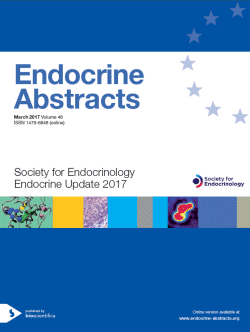Obesity Update
Oral Communications
ea0048oc1 | Oral Communications | SFEEU2017
Which test should the bariatric physician use to test for postprandial hypoglycaemia – prolonged oral glucose tolerance test versus mixed meal test?
Tharakan George , Behary Preeshila , Al-Najim Werd , Chahal Harvinder , Miras Alexander , Ahmed Ahmed , Bloom Stephen , Tan Tricia
ea0048oc2 | Oral Communications | SFEEU2017
Cardiac risk stratification in bariatric patients: a step to minimise heartache
Younus Hafsa , Sharma Amit , Majid Kiran , Sarma Diwakar , Chakravartty Saurav , Patel Ameet G.
ea0048oc3 | Oral Communications | SFEEU2017
The early improvement of glycaemia following RYGB can be mimicked by a Very Low Calorie Diet in obese volunteers with diabetes
Behary Preeshila , Tharakan George , Al-Najim Werd , Brown Adrian , Miras Alexander , Stoenchev Kostadin , Chahal Harvinder , Purkayastha Sanjay , Moorthy Krishna , Ahmed Ahmed , Bloom Steve , Tan Tricia
ea0048oc4 | Oral Communications | SFEEU2017
One year efficacy, safety and tolerability outcomes of endoscopic proximal intestinal exclusion therapy using the Endobarrier device: institution of the UK’s first National Health Service Endobarrier service for type 2 diabetes and obesity
Gupta Piya Sen , Yadagiri Mahender , Irwin Susan , Burbridge Wyn , Gandhi Hardeep , Alden Rachel , Bleasdale John , Fogden Ed , Anderson Mark , Ryder Bob
ea0048oc5 | Oral Communications | SFEEU2017
Copper deficiency presenting as subacute common peroneal nerve palsy post-duodenal switch surgery
Lim Jonathan ZM , Thomas Cecil
ea0048oc6 | Oral Communications | SFEEU2017
Complexities cause considerable confusion in confirming a case of Cushing’s (after gastric bypass surgery)
Crane James , Wierzbicki Anthony , Ramachandran Radha , McGowan Barbara
ea0048oc7 | Oral Communications | SFEEU2017
Pregnancy after bariatric surgery: a single-centre retrospective cohort study
Makaronidis Janine , Pucci Andrea , Manning Sean , Cheung Wui Hang , Kingett Helen , Buckley Grainne , Kirk Amy , Carr-Rose Kayon , Tshiala Anita , Jenkinson Andrew , Elkalaawy Mohamed , Hashemi Majid , Adamo Marco , O'Brien Pat , Richens Yana , Batterham Rachel
ea0048oc8 | Oral Communications | SFEEU2017




